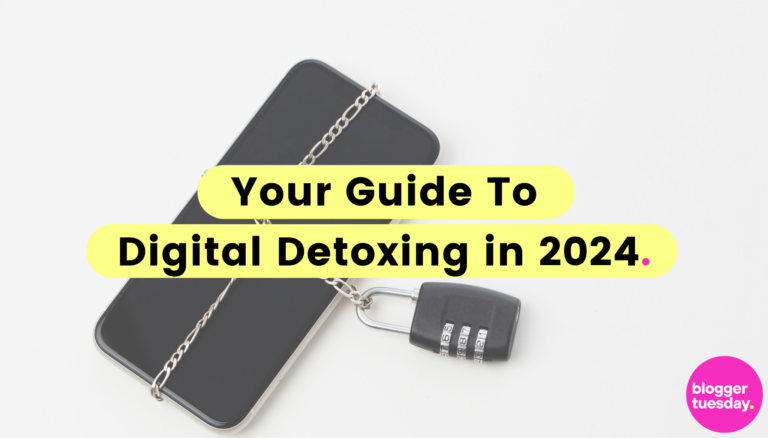You’re not alone if you feel like your brain is being progressively frazzled by digital technology. We’re currently living through an epidemic of device-induced overwhelm. You can’t even go to the toilet without WhatsApp and new feeds following you around.
But does it have to be this way?
According to a growing corpus of research, the answer is “no.” Going on a digital detox can reset your body and mind, helping you navigate the ever-present challenges of an always-online world.
This post introduces digital detoxes, why you might want to try them, and what the research says about too much digital connectivity. Then, we explore various strategies you can use to cut the metaphorical umbilical cords to your devices, reclaim your life and feel human again.
What Is A Digital Detox?
Digital detoxes are periods where you intentionally abstain from digitally connected electronic devices. (Don’t worry, you can still use your vacuum cleaner). The idea is to give your brain a rest from the constant stimulation and dopamine hits these products cause.
As such, digital detoxes are an opportunity to return to life before the internet. (It was only thirty years ago, in living memory for many of us!) You can use the time for relaxing strolls in nature, socialising with friends, or reading a book. The choice is yours!
Why Should You Try A Digital Detox, And What Does The Research Say?
According to researchers, constant connection to digital devices causes all sorts of dysfunctions. Consequently, detoxing could bring numerous benefits.
Reduce Stress
One significant advantage of digital detoxes is reducing stress. People who spend time away from their devices may feel less anxious than their always-connected counterparts.
For instance, the American Psychological Association’s annual Stress in America survey found that 18% per cent of adults believed that technology was a meaningful source of stress in their lives. A further study in Sweden linked excessive technology use to worrying.
Eliminate Behavioural Addiction
Another benefit of digital detoxes is their ability to eliminate behavioural addictions. (That’s probably where they got the name!) According to researchers, how people use their devices bears all the hallmarks of a compulsive habit.
You can see this everywhere. Perhaps you are guilty of it yourself. People spend hours hunched over their phones, focusing on the screen, not concentrating on the world or people around them. Everyone is busy posting online and responding to likes and comments on their social media feeds. And, worse still, many can’t help it.
Fortunately, going cold turkey prevents all this. Digital detoxes return you to your natural rhythm before the massive influx of technology.
Improve Contentment
Digital detoxes also benefit you by boosting contentment. Comparing your life to high-profile millionaire influencers with perfect bodies, relationships, and schedules is harder offline.
As the Daoist sage Lao Tzu once quipped, “comparison is the thief of joy.”
Reduce FOMO
Lastly, digital detoxes can help you escape FOMO or the “fear of missing out.” Instead of watching other people’s extravagant lives all day (and wondering why yours isn’t like theirs), you can return to being you.
Taking time out can improve your mental health and reduce the pressure on you to constantly attend social events or be seen to be doing something. You get more space to live your life without worrying when you need to whack out the next DM or post.
How To Do A Digital Detox
So, now we’re clear on the benefits of a digital detox, how do you perform one? Let’s take a look.
One idea is to schedule time away from your devices every week, just like people traditionally took the Sabbath off from work. We suggest taking a break at the weekend. This time off will give your nervous system time to reset and let you enjoy some much-needed non-digital activities.
During these days off, ensure you turn off your phone and keep it somewhere out of sight. Better yet, invest in a lockbox with a timed release so you can’t get at it in a moment of weakness. If someone needs to communicate with you, they can use the landline.
If you think you have a more profound addiction or behavioural problems related to digital device usage, go on a longer detox. Spending a week or month without technology can help reset your nervous system and give you time to develop healthier, more natural habits.
The best way to do this is to join others in digital detox communities and follow their lead. These long-timers often have strategies that help them stay away from their devices and live life like it’s the 1990s again.
Another way to do a hardcore digital detox is to delete your social media apps and wipe your accounts. Getting rid of them altogether helps you gain a sense of closure by preventing you from returning to them. (This approach is a bit like the old practice of cutting up your credit cards when you had too much debt).
Deleting your social media accounts and apps is somewhat extreme, so warn people first. Give old friends alternative means of contacting you to avoid leaving them out in the cold.
You can also test turning your phone off after a specific time in the evening every day as part of a digital detox. This approach is less radical than some of the above and helps you better balance your use of technology.
The timed approach is practical because it works with your natural rhythms. Insisting on an evening cut-off time lets you wind down in the evenings, preparing your body for rest.
It also helps you escape FOMO. You can watch television or sip a cup of tea without being reminded of all the high-status and exciting things you could be doing by social media influencers.
Another radical detox measure is to buy a dumb phone and use it for a set period. These old Nokia-style bricks are still around, with many going for pennies second-hand.
Dumb phones don’t have apps or allow you to access social media. But they still let you call and text people like it’s pre-2007. This way, you can stay connected to close contacts (if necessary) but avoid all the pinging, notifications and dopamine hits of regular smartphones.
Creating tech-free zones is also a tactic you can try if time-based methods don’t work for you. Disallowing smartphones and other digital devices in the bedroom or bathroom can be a fantastic way to establish a better balance in your life.
No-phone areas are especially valuable in sleeping quarters. Avoiding screens at night can help you relax and get your body into a more natural sleeping rhythm. It also lets you avoid stressful late-night texts and emails from your boss.
Another popular approach is simply to turn off notifications. This tactic is helpful for people who are perfectly content in the real world but find their enjoyment of it constantly interrupted by ping notifications.
Virtually all modern smartphones let you turn off notifications in the settings. However, you may need to check multiple boxes to turn off various notification types (such as pings from messages, social media accounts, and apps). Go through the whole list to ensure nothing gets through.
If locking your smartphone away in a physical box sounds too extreme, app time-blockers are another approach. These native settings let you limit how much time you spend on various applications, from social media to games to messaging services.
You can also use these apps to track your usage. Applications send you a jolt now and then when you go over your pre-specified time limits, reminding you to take a break and do something else.
Finally, checking your emotions when using digital devices is an excellent detox strategy. Being mindful of how you feel when using your smartphone can help you stop using it before you feel anxious or depressed or start engaging in unhealthy behaviours, such as excessive eating. Keeping track of your emotions will tell you when to disconnect and take time out. Learning the signs prevents you from undergoing more extreme detoxes down the line!
Remember, if you are struggling with mental health issues relating to your devices or social media, speak to a professional. Therapists now have specialist programmes and treatments for individuals struggling to adapt to our always-online world.
Wrapping Up
So what have we learned?
Essentially, digital detoxes are deliberate abstinence from smartphones, the internet, and other digital devices. These practices are becoming more popular as more people attempt to reclaim their lives from social media companies and the opinions of other internet users.
What’s more, science backs up the idea of going on a digital detox. Researchers believe abstaining from devices may reduce stress, increase contentment, improve sleep, and eliminate behavioural addictions.
You can start your detox journey by limiting when you use your smartphone or getting rid of it altogether. Don’t be afraid to go back to the 1990s. It was a cool time!


